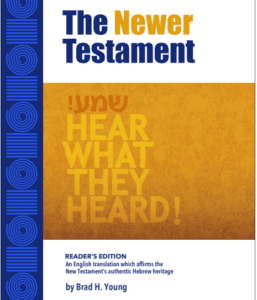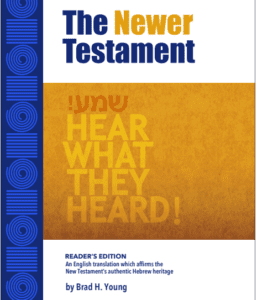
New Christian Bible Translation Underscores Jewish Roots of Christianity
“It is no secret that Christian scriptures have been misused over the centuries to incite antisemitism,” says Tricia Miller, who holds a PhD in the Hebrew Bible and currently works as a senior research analyst in the Christian department of the Committee for Accuracy in Middle East Reporting and Analysis (CAMERA).
“Too often, biblical passages have been taken out of context,” she says. “Influential translations and commentaries sometimes omit the Jewish dimensions of the ancient texts, leaving out the Jewish faith and practices that provided the context for the growth of Christianity in first century Judea and Samaria.”
But a new translation called the Hebrew Heritage Bible Newer Testament seeks to rectify the problem by highlighting the Jewish roots of Christianity.
“In contrast to other translations,” Miller says, “this important new version emphasizes the growth of Christianity within the time and place where the faith was born.”
The Bible’s translator is Dr. Brad H. Young, a Hebrew University-trained scholar who taught biblical literature for over thirty years at Oral Roberts University in the United States.
Young says, “Rather than employing the standard translation technique of simply selecting the most appropriate English word for the Greek, I asked the question, ‘What is the Hebrew thought and wording underpinning the Greek text?’”
Using this method, his text reconstructs the Hebrew sources, language, and mindset behind the early church and its foundational documents.
“Readers will now hear what first century listeners in ancient Israel would have heard because the translation brings to light the Jewish cultural, linguistic, and spiritual setting of Jesus as a Jew,” says Young.
Young’s translation is important because the Christian texts that have been routinely misinterpreted to promote antisemitism and the delegitimization of the State of Israel can now be understood in their accurate historical context.
“Young’s translation undermines the antisemitic misuse of the Christian scriptures,” Miller says. “At a time of rising antisemitism, his translation is an especially significant achievement.”
Miller goes on to point out that many academics still wrongly use the term “Palestine” when situating Jesus in the first century. “But, of course, ancient Israel wasn’t called ‘Palestine’ in Jesus’ lifetime,” she says. “The Romans introduced the term when they defeated the Bar Khokhba uprising in the second century, about a hundred years after Jesus’ death.”
Roman colonialists coined the word “Palestine” in order to insult the native Jewish population with the memory of their ancient enemies, the Philistines.
“Long after Jesus, the Romans replaced the name ‘Judea’ — which obviously not only references the Jews but was also the name used during Jesus’ ministry,” Miller says.
Miller notes that the misapplication of later Roman terminology to Jesus’ time has political repercussions today.
“Anti-Israel activists are exploiting this late Roman designation to falsely claim that Jesus wasn’t a Jew but rather a ‘Palestinian,’ a designation which would have had no meaning to a first century Jew such as Jesus,” says Miller. “The Hebrew Heritage Bible is a profound rebuke to those now trying to deny Jesus’ spiritual and cultural origins in their efforts to undermine Christian support for the State of Israel.”
The new Bible translation will be the subject of a free webinar presented by CAMERA’s Partnership of Christians and Jews with Dr. Brad H. Young and Tricia Miller on October 22, 2020 at 1PM EDT. Those interested in attending can register here.
Israel in the News
